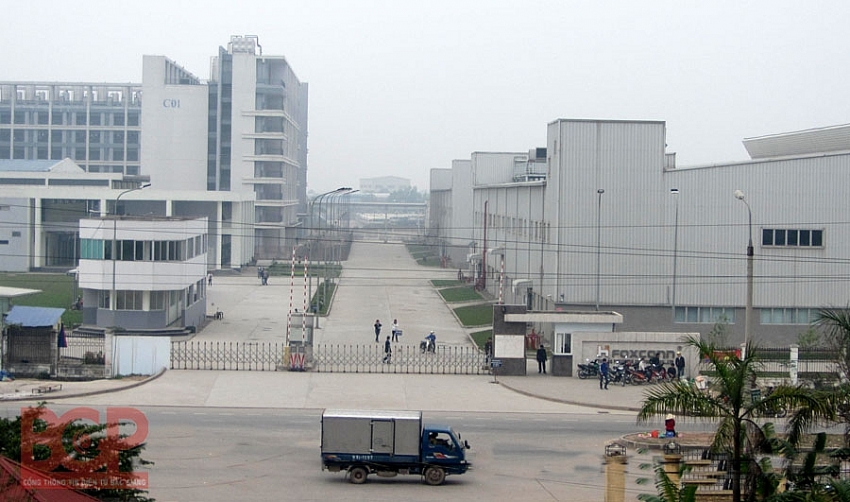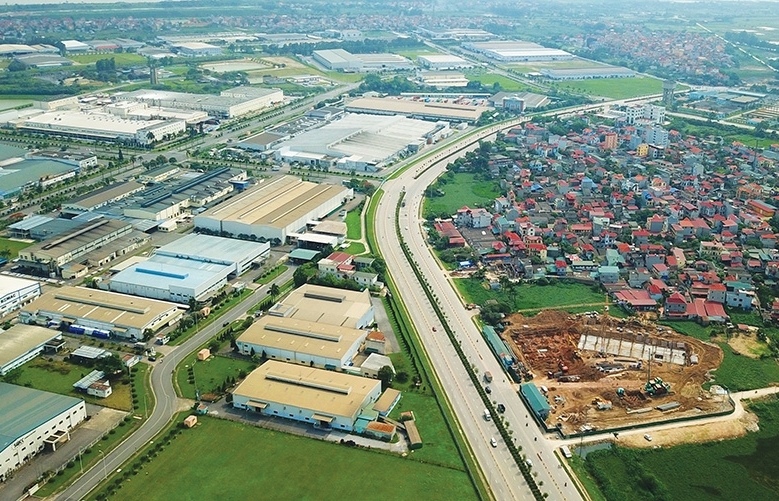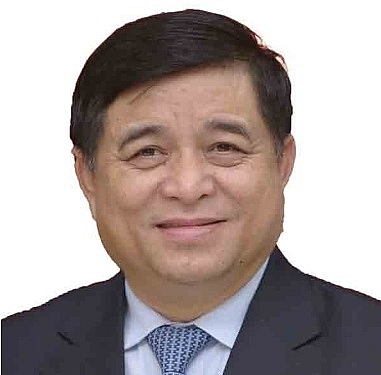 |
| Dinh Tram Industrial Park - Illustration photo (Source : BGP/An Nhien, bacgiang.gov.vn) |
In recent months, numerous foreign-invested projects violating current regulations have been detected in the most popular provinces among foreign investors, including Bac Ninh, Haiphong, and Bac Giang, with projects caught red-handed having started construction without obtaining the relevant permission.
Haiphong is one of the places where numerous projects have begun construction without the proper licences. In late 2019, a series of foreign investors received negative publicity for violating construction regulations, including Hecom Vietnam Co., Ltd., Taesung Engineering Vina Co., Ltd., and Autel Vietnam Co., Ltd.
The cases involved Chinese-invested Yaolong Vietnam Printing Co., Ltd. and Luxshare-ICT, a large partner of Apple, with the common denominator being that the unlicensed construction works were discovered when they were almost finished. The resulting penalties included nothing more than fines and stern warnings to the leaders of relevant supervisory departments and agencies in charge of supervising the projects.
One of the latest violations was by Luxshare-ICT, which was most recently issued a combined fine of VND340 million ($15,000) for violations in investment, environmental protection, and construction regulations, as well as in labour permits for foreign workers at Bac Giang Industrial Zone (IZ).
Luxshare-ICT, which was established in Vietnam in 2016 and has a second factory in the central province of Nghe An, registered VND4.19 trillion ($182 million) in the Bac Giang facility last year.
Accordingly, the company implemented its projects without issuing an environmental impact assessment report, built several structures that were not mentioned in its construction licence, and illegally recruited nearly 700 Chinese experts and workers.
Nguyen Mai, chairman of the Vietnam Association of Foreign-Invested Enterprises, told VIR, “Recent violations showed clear weaknesses in management at localities as well as lax oversight by local authorities in monitoring the companies’ operation. It also tells a great deal about the eagerness of cities and provinces to attract foreign investment that goes at the expense of ensuring the responsibility and potential of the foreign investors.”
It is difficult to understand how local authorities are so late in detecting issues at foreign-invested projects when they are so quick to crack down on violations at the local household level. Additionally, it is almost commonplace to see local authorities order the removal of violating construction works erected by households, while they only issue warnings and nominal fines to large foreign investors.
“I understand when an entire building is almost topped off, it would be a tremendous financial blow to ask the investor to tear it down, but letting them stay can be risky,” Mai explained. “The construction permit comes after a thorough evaluation of issues like safety requirements and environmental impact. If the building was raised without the local authorities verifying the appropriate parameters, what guarantees are there that the inspection of the finished product can uncover every mistake – and how would you fix them at that stage, anyway?”
Following queries by VIR, Nguyen Xuan Ngoc, deputy director of Bac Giang Industrial Zones Authority, said that in addition to the fines, the local authorities have ordered Luxshare-ICT to remove the offending buildings, but it remains questionable whether entire buildings developed to accommodate workers would actually be removed or if the foreign experts would return to their home country.
Vietnam’s laws on the supervision of foreign-invested projects are in place, with Decree No.84/2015/ND-CP issued in 2015 on supervision and assessment of investment assigning clear obligations to local authorities. The problem, however, lies not in the wording of the regulations but in its implementation, as local authorities seem to have glaring blind spots when following the progress of such projects.
The case of Chinese-invested Yaolong Vietnam Printing Co., Ltd. located in Chau Phong Industrial Cluster in Bac Ninh province is an example. The investor was slammed with a fine of VND40 million ($1,740) in May for constructing multiple buildings without a licence. Yaolong, licensed in March 2019, developed four manufacturing facilities and a four-storey office building as well as a warehouse and then went on to expand by an additional four manufacturing facilities and another four-storey office building.
However, its lack of a construction licence to begin even the first building was only discovered after the first phase was already finished and the expansion was almost complete.
“It is very difficult to understand how local authorities did not spot a four-storey office building or four whole manufacturing plants going up,” an industry observer said, adding, “This issue is nothing new – provinces have been working on regulation to reinforce supervision and control over foreign-invested projects, but it has never been more than secondary to attracting new projects.”
For instance, Danang People’s Committee last November issued its own regulation on supervising foreign-invested projects, besides complying with Decree 84.
“The regulation aims to ensure the detection of contrasting regulations. In addition, this regulation will also help us detect violations early in order to avoid to social impacts,” said Tran Phuoc Son, director of Danang Department of Planning and Investment (DPI).
“Each November, relevant authorities will have to submit a list of foreign-invested projects that need to be checked to Danang DPI to formulate inspection plans to submit to the People’s Committee for approval before November 15,” Son added. “Then, the inspection plans would be sent on to the Ministry of Planning and Investment before November 30.”
However, another representative of Danang DPI told VIR that while this regulation is in place, the COVID-19 pandemic has delayed the implementation of this until early next year.
The DPI has pledged to continue working with the relevant authorities to accelerate the completion of investment procedures for foreign-invested projects, with a view to helping them and speeding up the central city’s economic recovery.
Along with supervision of such processes, the Vietnamese government recently moved to create a new team focused on building on the diversification plans of large foreign investors. Last week, the government officially enacted Decision No.850/QD-TTg establishing a taskforce to boost foreign investment co-operation, serving as an impetus for catching investment capital inflows early from major global groups that are diversifying and repositioning manufacturing facilities after the COVID-19 pandemic.
The taskforce is aimed to provide advice for the government in formulating competitive investment attraction policies to tap into the wave of investment going into this global strategic relocation.
In addition, as a key priority for foreign investors is stability and legal consistency, the taskforce will complete the relevant legal framework. It will have to report to the prime minister on the progress towards its mission.
Deputy Prime Minister Pham Binh Minh has been assigned the role of head of the new taskforce, while Minister of Planning and Investment Nguyen Chi Dung is the permanent deputy head, and a deputy minister of the ministry will also be assigned as a deputy head. Other members of the taskforce include leaders of other ministries, the State Bank of Vietnam, and the Government Office.
|
Nguyen Chi Dung - Minister of Planning and Investment
Utilising its advantageous position and reputation – both of which have improved significantly in recent times – Vietnam has become a safe destination for foreign investors, trade partners, and tourists. However, we have to prepare a great deal to welcome the coming huge wave of investment, especially from multinational corporations. This work includes simplifying administrative procedures, developing infrastructure, and clarifying policies related to land, labour, energy, and master planning. The policies should be synchronous and decisions need to be made quickly. The most important task is selecting projects in line with the direction of the Politburo’s Resolution No.50-NQ/TW. This would ensure that foreign-invested projects can link up with other projects and provide chances for local businesses, particularly those in supporting industries, to join their value chains. Thus, ministries, agencies, and localities should actively make plans and take action to seize opportunities from the foreign investment movements, especially by multinationals with high-technology and dominant supply chains. While other countries are competing with Vietnam to mobilise foreign investment, we must provide attractive incentives as well as build a set of criteria to stave off projects that are low-tech, damaging to the environment, or are massively labour, natural resources, or energy-intensive. Nguyen Thien Nhan - Secretary, Ho Chi Minh City Party Committee
Vietnam has established economic relations with numerous countries and territories, 17 of which contribute 90 per cent of foreign investment in Vietnam, 80 per cent of the country’s international trade turnover, and 80 per cent of tourist arrivals. So it is of utmost importance to make careful preparations and plans resuming trade and business activities with these 17 markets. This is paramount because 10 of these 17 countries and territories have managed to control the coronavirus pandemic in the last few months. These include Japan, China, South Korea, Taiwan, Thailand, Hong Kong, Germany, Australia, Samoa, and the United Kingdom, which are going to resume economic activities with Vietnam soon. The situation in seven other countries (India, the United States, Russia, Singapore, the Netherlands, Indonesia, and Malaysia), which are not yet safe, will be strictly followed in the time coming. Experts forecast that foreign direct investment into Vietnam would decrease by 30 per cent this year, while international trade turnover would decline by 18 per cent and the number of foreign tourists by 50 per cent. Step-by-step re-opening trade with other countries will help us exploit overseas markets, mobilise foreign investment, as well as promote the domestic market and local investment. For this, three major aspects of Vietnam – its culture, political stability, and the economy – will be promoted. VIR |
Oanh Nguyen

Orientations put Hanoi onto investment radar
Amidst the global trend of investment shifts, Hanoi is betting on new orientations and solutions to increase its appeal, expecting to open opportunities for international investors to venture further afield.

Climbing the value chain to maximise investment
In general, foreign investors are seeking safe, stable investment environments with established real estate market practices, rule of law, and structured land ownership, with available financial support from banks.

